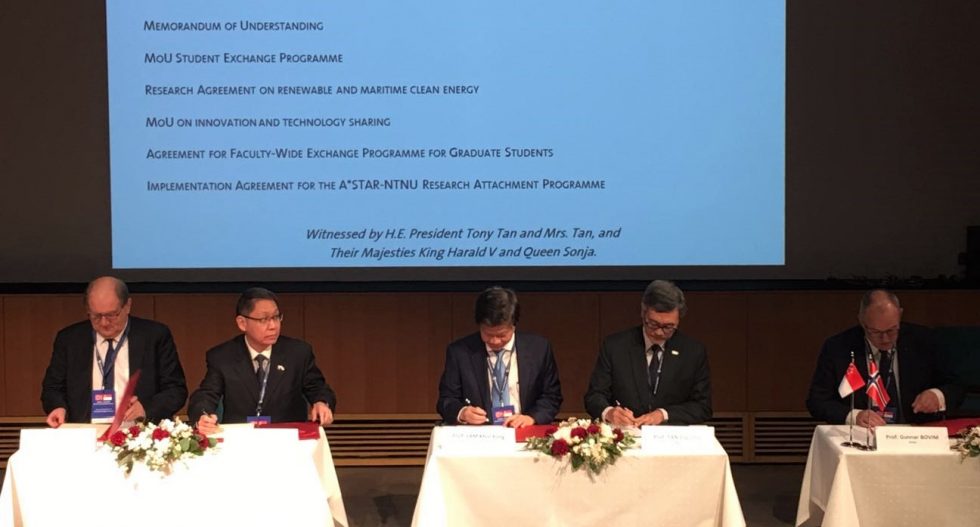Nanyang Technological University (NTU Singapore) will be deepening its collaboration with Norway in the areas of renewable energy, electric transportation and smart grids.
In addition to research, more NTU students will get to go on exchange to Norway.

NTU partners NTNU and DNV GL
These new initiatives are part of four partnership agreements signed during the state visit to Norway by His Excellency, Singapore President Tony Tan Keng Yam, from 10 to 12 October 2016.
NTU President Professor Bertil Andersson signed the three agreements on 11 October with Norwegian University of Science and Technology (NTNU), the main university for higher education in engineering and technology in Norway.
One agreement is for joint research into sustainable energy generation and end-use technologies; and the other two on university cooperation as well as staff and student exchanges.
Rector of NTNU, Professor Gunnar Bovim, signed the agreements on NTNU’s behalf.
In another agreement with DNV GL, a leading global organisation focused on advancing safety and sustainability of businesses, the two partners will study the impact of smart grid technologies on energy management in urban communities.
Prof Andersson said the new partnerships mark a milestone for the growing relationship between NTU and Norway.

“Both Singapore and Norway are small countries with a thriving economy and a strong focus on research and innovation. Sustainable development is also high on both countries’ agendas. NTU with our strengths in sustainable technologies and industry collaboration is a perfect partner for both NTNU and DNV GL, as they can leverage our top notch faculty and the NTU campus as a living testbed for cutting-edge technologies,” said Prof Andersson.
“We are very pleased to have signed these agreements. Knowledge based solutions to the grand challenges that the world faces today are imperative, as is the education of the next generation of highly skilled global citizens. No institution or country can achieve this alone and that is why we today cherish and celebrate the Singapore – Norway collaboration,” NTNU Rector Professor Gunnar Bovim said.
He added that NTNU has ambitious goals when it comes to student mobility: “Our priority is to send our students to partner universities of high quality and receive students from the same partner institutions. It is my hope that the NTU – NTNU agreement establishing a student exchange programme including both undergraduate and postgraduate students will be contributing to exactly that.”
The NTU and NTNU collaboration will focus on research and development in various aspects of energy research, which includes electric transportation and offshore renewables.
The collaboration also covers scientific and education cooperation, including joint research projects, exchange of faculty, staff, and students; and interaction through meetings and seminars.
This new research effort builds on the existing partnership that the NTNU has with the Energy Research Institute @ NTU (ERI@N), which involves multiple industry partners like turbine manufacturers, transport and technology firms.
Jointly supervised by both universities, the new research projects will comprise areas such as simulation and validation of subsea power systems, offshore structural dynamics, advanced materials, computational fluid dynamics, structural health monitoring, subsea grid studies and energy storage integration.
NTU first signed a Memorandum of Understanding with NTNU in 1998, which is renowned for its engineering, natural and physical sciences as well as arts and medicine.
The two universities then followed up with an MOU on student exchange, which has enabled some 250 students to go on exchange since 2001.
The annual number of NTU students on exchange to Norway will now increase to 24 places. Also, more Norwegian students can come to NTU for summer programmes. This will add to the diversity of overseas education options available to students from both countries.
The new research tie-up between NTU and DNV GL aims to study the use of intelligent energy systems to promote energy efficiency, demand management, and its impact on smart energy management technologies for large urban cities like Singapore.
and Mr Remi Eriksen, Group President and CEO, DNV GL, signed the agreement today
“This research partnership is important to Singapore and other highly urbanised cities, as it will develop and testbed new solutions needed to reduce energy usage in residential and commercial developments. It also aims to improve efficiency in the management of energy grids,” said Professor Lam Khin Yong, NTU Chief of Staff and Vice-President (Research).
Mr Remi Eriksen, Group President and CEO at DNV GL, said DNV GL has roots in Singapore going back more than a century with permanent offices since 1964.
“We are strongly committed to research and innovation to help advance industrial progress and to create benefits for society at large, I am therefore proud of our partnership with NTU, one of Asia’s leading universities, in the energy domain. The joint project on smart grids and energy management in urban communities fits well with the DNV GL Group’s overall strategy and the further development of our Clean Technology Centre in Singapore.”
A new Research, Development and Demonstration project will be carried out on the NTU campus as part of the university’s EcoCampus living lab programme, which tests innovative system level solutions for greater energy efficiency and sustainability.
To be test-bedded at the NTU staff residences and the Nanyang Executive Centre, these smart grid technologies will help in the wider deployment of such technologies as part of the university’s commitment to build smart and sustainable communities.

